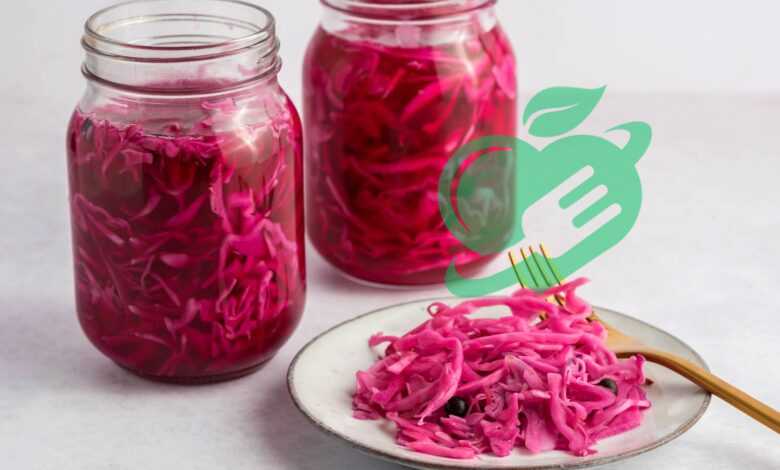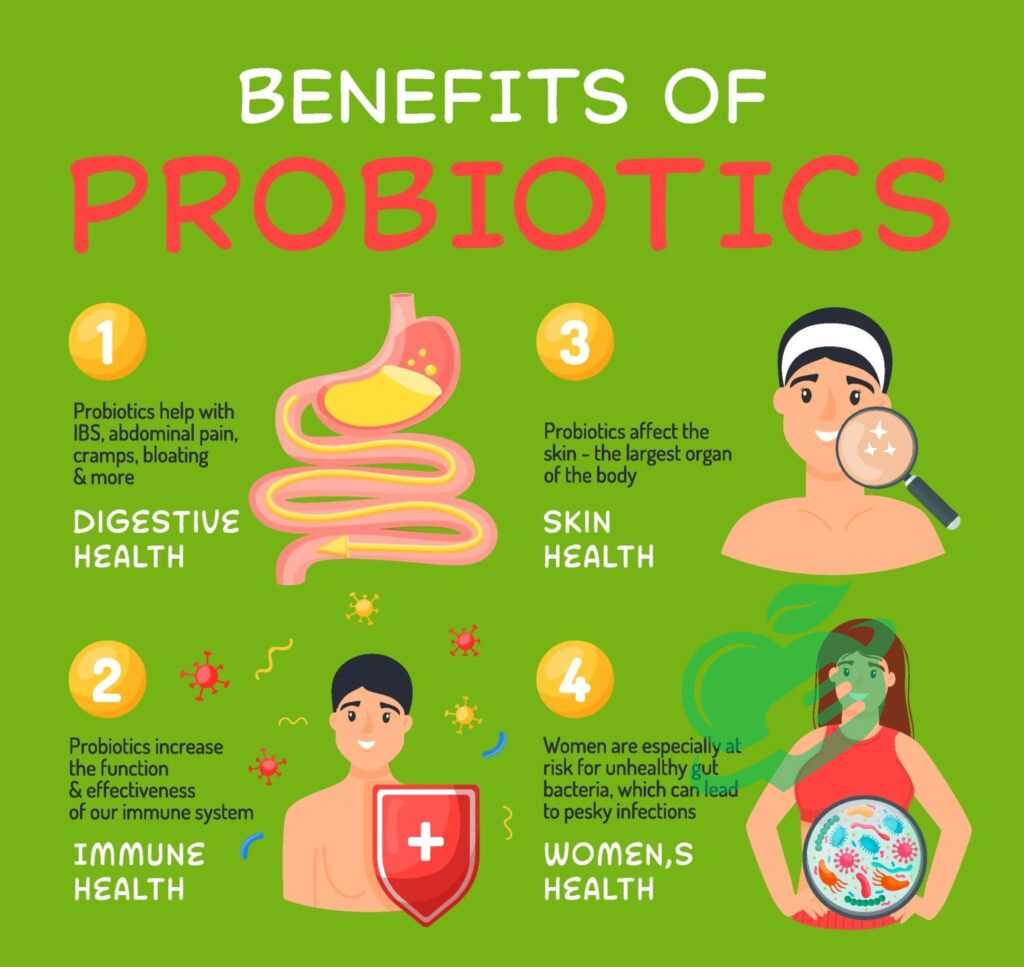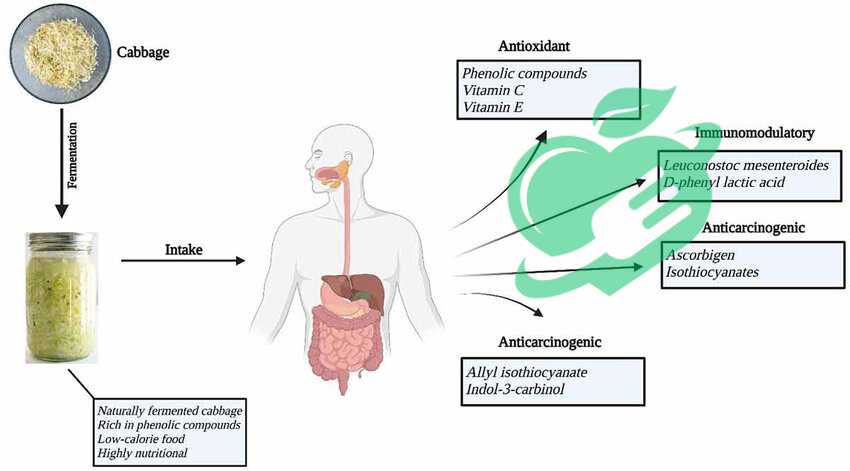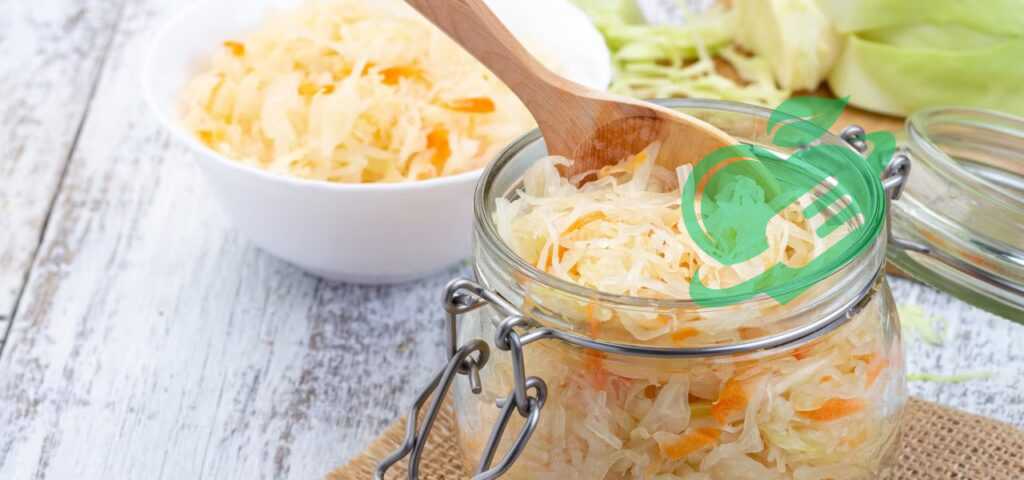Exploring the Health Benefits of Sauerkraut: A Superfood for Gut Health

What is Sauerkraut?
Sauerkraut is more than just a tangy topping for your hot dog—it’s a fermented dish made primarily from finely shredded cabbage. Originating from Germany, this dish has gained popularity worldwide, not only for its unique flavors but also for its impressive health benefits. The fermentation process, driven by beneficial bacteria, transforms cabbage into a probiotic powerhouse. When you take a bite of sauerkraut, you’re not only tasting something delicious; you’re also consuming a product rich in vitamins, minerals, and probiotics. It’s packed with Vitamin C, Vitamin K, and dietary fiber, helping to enhance overall wellbeing. Here’s a quick breakdown of sauerkraut’s core ingredients:
- Cabbage: The base ingredient, rich in nutrients.
- Salt: Essential for fermentation, aiding in flavor and preservation.
- Water: Need for the fermentation process, helping to create a brine.
This delightful dish can be enjoyed in various forms, whether as a side salad, a topping for sandwiches, or even a delicious addition to soups.
Importance of Gut Health
Gut health is a crucial aspect of overall wellbeing that often goes overlooked. Our gut houses trillions of microbes, and maintaining a balanced microbiome is essential for optimal health. In fact, a healthy gut can influence digestion, immunity, and even mental health. Consider this:
- Digestion: A strong microbiome aids in nutrient absorption and regular bowel movements.
- Immune System: Approximately 70% of the immune system is housed in the gut.
- Mental Clarity: Research indicates a link between gut health and mood, emphasizing the mind-gut connection.
By incorporating foods like sauerkraut into your diet, you can support gut health and relish its numerous advantages. This simple inclusion can lead to significant improvements in digestion and overall wellbeing. Whether you’re just beginning your health journey or are a seasoned wellness enthusiast, sauerkraut is a flavorful and nutritious ally in your quest for a healthier gut.

Nutritional Value of Sauerkraut
Vitamins and Minerals
One of the standout features of sauerkraut is its remarkable nutritional profile, particularly in terms of vitamins and minerals. This fermented food serves as a natural source of essential nutrients that our bodies crave. For instance, just one cup of sauerkraut can provide a significant contribution to your daily nutritional needs, including:
- Vitamin C: Vital for immune function and skin health.
- Vitamin K: Important for blood clotting and bone health.
- Folate (Vitamin B9): Essential for cell division and proper fetal development during pregnancy.
- Manganese: A key mineral that plays a role in metabolism and bone formation.
Here’s a quick breakdown of these nutrients:
| Nutrients | Quantity per cup | Benefits |
|---|---|---|
| vitamin c | 14 milligram | Supports immune function and skin health |
| vitamin k | 24 Microgram | Aids in blood clotting and bone health |
| Folic acid | 25% Daily value | Crucial for cell division and pregnancy |
| Manganese | 0.2 milligram | Supports metabolism and bone structure |
These vitamins and minerals not only nourish the body but also enhance the digestive and immune system functions.
Probiotics Content
Equally impressive is the probiotic content found in sauerkraut. Probiotics are beneficial bacteria that play a vital role in maintaining gut health. Fermentation creates a rich environment for these microorganisms, making sauerkraut an excellent source of gut-friendly bacteria. When regularly consumed, these probiotics can offer numerous health benefits:
- Improved Digestion: They help break down food and promote better nutrient absorption.
- Enhanced Immune Response: A well-balanced gut microbiome can lead to a stronger immune system.
- Mood and Mental Health Support: Emerging research suggests probiotics have a positive impact on mental clarity and emotional wellbeing.
For those looking to optimize their gut health, sauerkraut serves as a delicious and effective way to introduce beneficial probiotics into the diet. Its incorporation can be both tasty and transformative, adding not just flavor but also a healthful punch to meals. So, next time you reach for that jar of sauerkraut, remember—you’re not just enjoying a tangy treat; you’re fueling your body with rich nutrients and beneficial bacteria!
Read also : Vaginitis Unveiled: Symptoms, Treatments, and Prevention

Health Benefits of Sauerkraut
Improved Digestion
One of the most significant health benefits of sauerkraut is its ability to enhance digestion. The probiotics present in this fermented food are known for their gut-friendly properties. They actively contribute to better digestion and assimilation of nutrients. Individuals who struggle with digestive issues such as bloating or irregular bowel movements may find sauerkraut to be a natural remedy. The beneficial bacteria help break down food more efficiently, making it easier for the body to absorb nutrients. Here are some ways sauerkraut promotes digestive health:
- Prebiotics and Probiotics: Sauerkraut contains both prebiotic fibers and probiotics, supporting a balanced gut microbiome.
- Increased Digestive Enzymes: The fermentation process boosts the production of enzymes that aid in food breakdown.
- Soothing Gut Irritation: Probiotics can help alleviate symptoms of conditions such as irritable bowel syndrome (IBS).
Boosted Immune System
Sauerkraut not only supports digestive health but also plays a critical role in fortifying the immune system. Approximately 70% of our immune system resides in the gut, making it vital to maintain gut health for overall immunity. Regular consumption of sauerkraut can lead to a robust immune response, thanks to:
- Rich Nutritional Profile: The vitamins and minerals found in sauerkraut, such as Vitamin C and K, bolster immune function.
- Probiotics: Beneficial bacteria enhance immune activity, making it easier for the body to fend off infections.
On a personal note, many individuals have reported that incorporating sauerkraut into their meals during cold and flu season has helped them stave off illnesses more effectively than relying solely on supplements.
Anti-inflammatory Properties
Finally, sauerkraut boasts impressive anti-inflammatory properties. Chronic inflammation is linked to numerous health issues, including heart disease and arthritis. Fortunately, the nutrients found in sauerkraut can help combat inflammation in a natural way. Research suggests that:
- Antioxidants: The vitamins and probiotics in sauerkraut aid in reducing oxidative stress, which contributes to inflammation.
- Gut Health: A balanced gut microbiome can lead to reduced levels of inflammation throughout the body.
In sum, incorporating sauerkraut into your diet can yield a plethora of health benefits. From improving digestion and boosting immune function to reducing inflammation, this humble fermented dish is a powerful ally in the journey toward better health. Whether enjoyed on its own or as a flavorful ingredient in various dishes, sauerkraut is undoubtedly a worthy addition to any wellness routine.

How to Incorporate Sauerkraut into Your Diet
Serving Suggestions
Incorporating sauerkraut into your daily meals doesn’t have to be daunting. This tangy, crunchy fermented food is not only nutritious but also incredibly versatile! Here are some creative serving suggestions to help you enjoy sauerkraut in your diet:
- As a Topping: Add a generous spoonful of sauerkraut to your sandwiches, burgers, or hot dogs to add a zesty crunch.
- In Salads: Mix sauerkraut into your green salads or grain bowls for an extra kick and probiotics boost.
- With Eggs: For a hearty breakfast, try pairing sauerkraut with scrambled eggs or as a topping for an omelet. The combination makes for a deliciously unique flavor.
- As a Side Dish: Serve sauerkraut alongside your main dishes, such as grilled meats or roasted vegetables, to complement the flavors.
A personal favorite of many is a simple snack: enjoy sauerkraut with whole-grain crackers and a slice of cheese. This provides a perfect balance of flavors and textures!
Recipes Using Sauerkraut
If you’re looking to elevate your culinary experience with sauerkraut, here are two simple yet delicious recipes that can easily be made at home: 1. Sauerkraut and Potato Casserole
- Ingredients:
- 4 cups sauerkraut, drained
- 4 medium potatoes, thinly sliced
- 1 onion, diced
- 1 cup shredded cheese (optional)
- Salt and pepper to taste
- Instructions:
- Preheat oven to 375°F (190°C).
- In a baking dish, layer half of the potatoes, then half of the sauerkraut, and half of the onion.
- Season with salt and pepper, and repeat the layers.
- Top with shredded cheese if desired.
- Cover with foil and bake for 45 minutes, then remove foil and bake for an additional 15 minutes until golden.
2. Sauerkraut Stir-Fry
- Ingredients:
- 2 cups sauerkraut, drained
- 1 bell pepper, sliced
- 1 carrot, julienned
- 1 tablespoon olive oil
- 1 teaspoon caraway seeds (optional)
- Instructions:
- In a large skillet, heat olive oil over medium heat.
- Add bell pepper and carrot, sautéing until they begin to soften.
- Add sauerkraut and caraway seeds, cooking for an additional 5 minutes until heated through.
These dishes are not just easy to make; they also provide an excellent opportunity to enjoy the health benefits of sauerkraut while savoring delicious flavors. By exploring different ways to incorporate sauerkraut into your meals, you’ll discover a delightful array of possibilities that can transform your eating habits and contribute to your overall health journey!

Sauerkraut vs. Pickles and Kimchi
Key Differences
When it comes to fermented foods, sauerkraut, pickles, and kimchi often take center stage, each with a unique flavor profile and preparation method. Understanding their differences can help you make informed choices about which one to incorporate into your diet.
- Base Ingredient:
- Sauerkraut: Primarily made from finely shredded cabbage mixed with salt.
- Pickles: Typically made from cucumbers, though other vegetables can be pickled as well.
- Kimchi: A Korean dish made from fermented vegetables, primarily napa cabbage and radishes, often seasoned with spices and garlic.
- Fermentation Process:
- All three undergo fermentation, but kimchi is usually flavored with ingredients like chili paste and ginger, giving it a spicy kick compared to sauerkraut’s tangy flavor. Pickles can vary widely based on their brine, leading to sweet, sour, or spicy notes.
- Cultural Origin:
- Sauerkraut has roots in Eastern European cuisine, while kimchi is foundational to Korean meals. Pickles are widely popular in many cultures, often associated with North American traditions.
For example, while enjoying a picnic, you might find sauerkraut on a bratwurst, pickles on a burger, and kimchi accompanying a bowl of rice—all delightfully distinct offerings!
Health Comparison
When comparing these three fermented delights from a health standpoint, each offers unique benefits:
- Sauerkraut: High in fiber and Vitamin C, it promotes gut health through its probiotic content. It’s an excellent option for aiding digestion.
- Pickles: The nutrition varies based on preparation. Pickles are often lower in calories but can be high in sodium due to the brining process. They provide minimal probiotics unless fermented naturally.
- Kimchi: Packed with vitamins A, B, and C, kimchi boasts a potent mix of probiotics and antioxidants. Its spicy ingredients may also contribute to an enhanced metabolism.
| purpose | Probiotics | Fiber | Vitamins |
|---|---|---|---|
| Sauerkraut | Yes | High | A, C, K |
| pickles | Depends on | a little | Minimal |
| Kimchi | Yes | moderate | A, B, C |
In summary, while sauerkraut, pickles, and kimchi are all fermented foods worthy of your plate, their differences in ingredients, fermentation processes, and health benefits make them uniquely beneficial. Depending on your taste preferences and nutritional goals, you can choose one or all of these delicious options to enhance your diet and enjoy the many flavors they bring!
Read also : Unraveling the Mystery: Common Triggers of Painful Urination

Making Sauerkraut at Home
Ingredients and Equipment
Making sauerkraut at home is not only rewarding but also a fun way to experiment with flavors and fermentation. The process is simple and requires only a few essential ingredients and basic equipment. Ingredients:
- Cabbage: One medium green cabbage (around 3-4 pounds) is ideal.
- Salt: Non-iodized salt is essential for fermentation; coarse sea salt or kosher salt works best.
- Optional: Caraway seeds, garlic, or other seasonings to personalize your sauerkraut.
Equipment:
- Sharp Knife or Mandoline: For shredding the cabbage.
- Large Mixing Bowl: To mix the ingredients.
- Fermentation Container: A large glass jar, ceramic crock, or food-grade plastic container. Ensure it can hold at least 2-3 liters.
- Weight or Clean Stone: To keep the cabbage submerged under its brine.
- Cloth Cover: To protect it from dust and pests while allowing gases to escape.
As someone who recently tried this for the first time, the experience was surprisingly enjoyable. Watching the transformation from raw cabbage to tangy sauerkraut felt magical.
Step-by-Step Fermentation Process
Here’s a simple, step-by-step guide to fermenting your own sauerkraut:
- Prepare the Cabbage:
- Remove the outer leaves, then slice the cabbage into quarters, removing the core. Use a sharp knife or mandoline to shred it finely.
- Salting the Cabbage:
- Place the shredded cabbage in a large bowl, adding 1.5 tablespoons of salt for every 1.5 pounds of cabbage. Massage the salt into the cabbage for about 5-10 minutes until it releases its liquid.
- Packing the Jar:
- Transfer the salted cabbage into your fermentation container. Pack it tightly to minimize air pockets. Pour any released liquid over the top.
- Weighing Down:
- Place a weight or clean stone on top of the cabbage to keep it submerged in the brine. This is crucial for the fermentation process.
- Covering:
- Cover the container with a cloth or lid (if using an airlock container) to keep out dust while allowing gases to escape.
- Fermentation:
- Place your container in a cool, dark spot (around 65-75°F, or 18-24°C). Ferment for 1 to 4 weeks, tasting occasionally until it reaches your desired flavor.
After successfully making your own sauerkraut, the thrill of enjoying your homemade product is unmatched! You’ll find it not only elevates your meals but also gives a sense of pride in your culinary skills. Happy fermenting!

Potential Risks and Considerations
Sodium Content
While sauerkraut is celebrated for its numerous health benefits, it’s essential to be mindful of its sodium content, particularly if you are watching your salt intake. The fermentation process involves adding salt to the cabbage, which not only enhances flavor but also promotes the growth of beneficial bacteria. However, this also means that sauerkraut can be relatively high in sodium. For instance, a typical serving (about one cup) of sauerkraut can contain anywhere from 600 to 900 mg of sodium. This could pose a concern for individuals with specific health conditions such as:
- High Blood Pressure: Excessive sodium intake can lead to hypertension, making it crucial for those with this condition to limit their sauerkraut consumption.
- Kidney Issues: For individuals with compromised kidney function, high sodium can exacerbate the condition, as the kidneys may struggle to filter out excess salt.
To balance your sauerkraut intake while still enjoying its benefits:
- Rinse before Eating: If the sodium content is a concern, try rinsing the sauerkraut under cold water before consuming. This simple step can significantly reduce the sodium level.
- Moderation is Key: Enjoy sauerkraut in moderation, balancing it with low-sodium foods throughout your meals.
Allergic Reactions
Another consideration when consuming sauerkraut is the potential for allergic reactions and sensitivities. While cabbage itself is generally safe for most people, some individuals may experience adverse reactions due to:
- Histamine Sensitivity: Fermented foods, including sauerkraut, can trigger symptoms in those with histamine intolerance, leading to headaches, flushing, or digestive upset.
- Food Allergies: Rarely, individuals may have allergies to specific ingredients used in making sauerkraut, such as certain spices or additives.
If you’re new to sauerkraut or have a history of food sensitivities, try a small amount first and observe how your body reacts. It’s always a good practice to consult with a healthcare professional about any food concerns, especially if you have known allergies or health conditions. By staying informed about these potential risks and practicing moderation, you can enjoy the many benefits of sauerkraut while minimizing any adverse effects. This ferments delight should be a joyful addition to your diet, promoting gut health and enhancing flavors!
Read also : The Pelvic Exam: What Every Woman Should Know

Recap of Sauerkraut Benefits
As we’ve explored throughout this blog, sauerkraut is not just a delightful tangy treat—it’s a powerhouse of nutrition and health benefits. Let’s quickly recap some of the standout advantages of this fermented food:
- Nutrient-Rich: Sauerkraut is an excellent source of vitamins like C and K, along with minerals that support various body functions.
- Probiotics for Gut Health: The fermentation process enriches sauerkraut with beneficial probiotics, which aid digestion and enhance overall gut health.
- Supports Immune Function: Regular consumption of sauerkraut can strengthen the immune system, making it a valuable addition to your diet, especially during cold and flu seasons.
- Anti-inflammatory Properties: Thanks to its antioxidants and nutrients, sauerkraut may help reduce inflammation in the body.
Personal experiences shared by fellow enthusiasts highlight how integrating sauerkraut into their diets has led to improved digestive health and a more vibrant lifestyle.
Encouragement for Gut Health Journey
Embarking on a gut health journey can feel overwhelming, but incorporating foods like sauerkraut can make a significant difference. It’s all about small, manageable steps. Whether you’re a seasoned foodie or just getting started, adding fermented foods to your meals is a simple yet impactful way to support your health. Here are a few tips to encourage you along your gut health journey:
- Start Slow: If you’re new to sauerkraut, begin with small quantities and gradually increase your intake as your gut adapts.
- Explore Varieties: Don’t hesitate to try different types of sauerkraut or other fermented foods like kimchi and pickles to discover what you enjoy most.
- Stay Consistent: Make incorporating probiotics a regular part of your meals for long-term benefits. Consistency is key for a healthy gut.
Ultimately, embracing the art of fermentation and exploring its health benefits can be a rewarding venture. Sauerkraut is just one of the many delicious ways to boost your health naturally. So grab a fork and dig into this flavorful journey towards better gut health!




One Comment